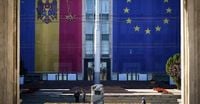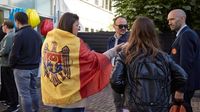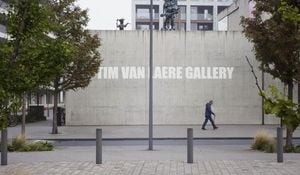In a dramatic and closely watched parliamentary election over the weekend, Moldovans delivered a decisive victory to the pro-European Party of Action and Solidarity (PAS), reaffirming the country’s Westward trajectory and dealing a blow to pro-Russian factions. The results, announced on Monday, confirmed that PAS, led by President Maia Sandu, secured 50.1% of the vote—translating to about 55 of the 101 seats in parliament—while the Moscow-aligned Patriotic Electoral Bloc trailed far behind with 24.2%. Smaller parties, including the Russia-friendly Alternativa Bloc, the populist Our Party, and the right-wing Democracy at Home party, also cleared the threshold for parliamentary representation, but none came close to challenging PAS’s majority.
According to The Associated Press, the election was widely viewed as a pivotal moment, a clear choice between continuing Moldova’s path toward European Union membership or drifting back under Moscow’s influence. The stakes were high: Moldova, a small country wedged between war-battered Ukraine and EU-member Romania, has emerged as a geopolitical battleground since Russia’s full-scale invasion of Ukraine in 2022. That invasion prompted Moldova to formally apply for EU membership, and it was granted candidate status later that year.
European leaders were quick to praise Moldovans for their resolve. European Commission President Ursula von der Leyen, in a post on X, declared, “You made your choice clear: Europe. Democracy. Freedom. No attempt to sow fear or division could break your resolve.” Her words echoed the widespread sentiment in Brussels, where the outcome was seen as a robust endorsement of Moldova’s Western ambitions despite intense external pressure.
The campaign itself was fraught with tension and allegations of foreign interference. President Sandu’s government repeatedly warned of Russian meddling, accusing Moscow of orchestrating a ‘hybrid war’ that included everything from massive disinformation campaigns and cyberattacks to outright vote-buying schemes. As reported by The New York Times and Politico, Moldovan authorities claimed that Russia spent hundreds of millions of dollars attempting to sway the vote, with researchers and online monitoring groups identifying coordinated campaigns—some powered by artificial intelligence—flooding social media and fake websites with anti-EU propaganda.
Election day was marred by a series of disruptive incidents: bomb threats at polling stations abroad, cyberattacks on government infrastructure, and reports of voters being illegally transported to cast ballots. In Chisinau, the capital, police arrested three individuals suspected of plotting to incite riots after the vote. According to Al Jazeera, authorities had already detained dozens in the weeks leading up to the election, alleging ties to Russian-backed efforts to destabilize the country.
Despite these challenges, turnout was robust. The Central Electoral Commission reported that about 1.6 million people, or 52.1% of eligible voters, cast ballots—a higher participation rate than in previous elections. Notably, the Moldovan diaspora played an outsized role: around 280,000 votes came from polling stations abroad, primarily in Europe and the United States. As Politico noted, ballots from Moldovans living overseas were “critical in swinging the result.”
For many voters, the choice was stark. “I see progress in our government and in our evolution ... how to be a part of Europe,” said 21-year-old student Nichita Prepelita, as quoted by The Associated Press. “PAS said Moldova will integrate into the European Union in 2028. For me, it’s a little bit hard to believe ... but I hope it will be. Now people are really choosing between ... Europe and Russia.”
The mood at PAS headquarters on Monday morning was jubilant, but tinged with caution. Party leader Igor Grosu described the election as another battle against “enemies of our country that once seemed impossible to defeat,” emphasizing that “it was not only PAS that won these elections, it was the people who won.” Grosu accused Russia of deploying “mountains of money, mountains of lies, mountains of illegalities” in an attempt to turn Moldova into “a haven for crime.”
Prime Minister Dorin Recean, who is expected to be re-nominated by President Sandu to lead the new government, echoed these sentiments. Speaking to reporters, Recean said, “The major task right now is to bring back the society together, because what Russia achieved is to produce a lot of tension and division in society.” He added, “Moldovans demonstrated that their freedom is priceless and their freedom cannot be bought, their freedom cannot be influenced by Russia’s propaganda and scaremongering.”
International observers and analysts underscored the significance of PAS’s outright majority. Cristian Cantir, an international relations professor at Oakland University, told The Associated Press that the result spares PAS from forming a potentially unstable coalition, allowing it to “ensure continuity in the next few years in the pursuit of their ultimate goal of EU integration.” However, Cantir cautioned that Moldova “will continue to be in a difficult geopolitical environment characterized by Russia’s attempts to pull it back into its sphere of influence.”
The Kremlin, for its part, voiced grievances about the conduct of the election. Kremlin spokesperson Dmitry Peskov claimed that “hundreds of thousands” of Moldovans living in Russia were unable to vote due to an insufficient number of polling stations, though he offered no specifics. Meanwhile, former president and Patriotic Electoral Bloc leader Igor Dodon, after alleging—without evidence—that PAS had meddled with the vote, called for protests outside the parliament building. Dozens gathered on Monday, but the protests remained small and peaceful.
In the wake of the vote, President Sandu struck a unifying tone, stating, “Moldova is our common home. We all share the same hopes: to live in peace and freedom, and to offer our children a safe future here, at home. The surest path to those goals is the European path. Yesterday’s vote is a strong mandate for Moldova’s EU accession.”
The road ahead remains challenging. Moldova, one of Europe’s poorest countries, must still deliver on the reforms required for EU membership, including strengthening democracy, human rights, and the rule of law. The breakaway region of Transnistria—where Russian troops are stationed and pro-Russian sentiment runs high—continues to pose a thorny problem. And while the PAS victory represents a clear mandate for European integration, the specter of external interference and internal division lingers.
Still, for now, Moldovans have sent an unambiguous message to both Brussels and Moscow. As Ukrainian President Volodymyr Zelenskyy put it in his congratulatory call to President Sandu, “Russian subversion, constant disinformation—none of this worked.” The small nation, caught between giants, has chosen its path. Whether Moldova can stay the course through turbulent times remains to be seen, but for many, hope burns brighter than ever.





